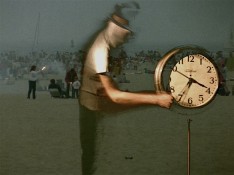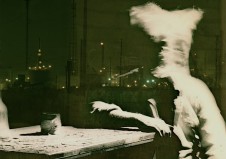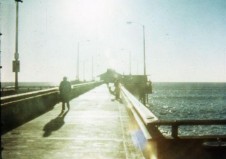Pat O’Neill’s WATER & POWER + Gary Beydler’s VENICE PIER

Water and Power
7th House at the Philosophical Research Society and Los Angeles Filmforum present
Pat O’Neill’s WATER & POWER (O’Neill in Person)+ Gary Beydler’s VENICE PIER
Sunday June 15, 2025, 7:00pm
At the Philosophical Research Society, 3910 Los Feliz Boulevard Los Angeles, CA 90027
Please email events@prs.org or phone 323-663-2167 with any questions
The Philosophical Research Society and Los Angeles Filmforum present Pat O’Neill’s masterpiece — a complex, avant garde LA city symphony, alongside an underseen experimental gem!
Tickets: Ticket Price: $12 + fees (In-Person Only Event) ($14.64 total); Free to Los Angeles Filmforum members
"The 'reality' animated by the film is LA; its topography and social ambiance, its myths of creation and embedding of a dream. It is surely the greatest of contemporary 'city symphonies.'" - Paul Arthur, Moving Picture
"... reveals a modern city as layer over layer of experience, and makes no pretense of reducing Los Angeles to anything like a single, coherent understanding. In WATER AND POWER, LA is not merely an elaborate reality; it is a nearly overwhelming surreality." - Scott McDonald, Wide Angle
"The continuous shifts and surprises that lie at the heart of the film's form make a kind of grand metaphor for the never-ending change that underlies nature, civilization and the multiply symbiotic interchanges between them." - Fred Camper, Chicago Reader
As part of YesterdayLA, the Philosophical Research Society’s monthlong exploration of Los Angeles history, Los Angeles Filmforum and 7th House are proud to present an evening of two films which cast their strikingly singular eyes on our city: Pat O’Neill’s experimental documentary masterpiece WATER AND POWER (1989) and Gary Beydler’s astonishingly inventive VENICE PIER (1976) – both presented on 16mm!
ABOUT YesterdayLA
This June, the Philosophical Research Society celebrates our beloved city’s rich and diverse past with YesterdayLA, a month-long exploration of unique stories and works of art that have become part of the fabric of Los Angeles history. The landscape of our city is changing faster than ever before. By examining the LA of yesterday, we invite Angelenos to gather together to not only look back but forward to the possibilities of our great city’s tomorrow.
Throughout its 90+ year history The Philosophical Research Society has stood as a sanctuary for those seeking truth and enlightenment, with its doors open to Angelenos who have created great works of art and innovation, political movements, and spiritual evolutions across the eras. YesterdayLA will explore the fascinating stories of our city’s past with the continued spirit of curiosity that has stood as the pillar of PRS’s mission.
----------------------
ACCESSIBILITY
PRS wants all guests to be able to enjoy our events safely and comfortably. If you require any accessibility accommodation, please reach out to events@prs.org before showtime and we will be happy to assist you.
REFUND POLICIES
All sales are final. There are no refunds or exchanges for PRS events, except in the event of a medical emergency, including but not limited to a positive COVID-19 test. In the event that PRS is forced to cancel an event entirely, tickets will be refunded or vouchers offered for a rescheduled event.
PARKING
Limited parking is available onsite at PRS in both the front lot (entry from Los Feliz Blvd. when heading east) and back lot (entry from first alley way, off Griffith Park Blvd. from intersection with Los Feliz Blvd.), as well as street parking on Griffith Park Blvd. and (after 7 PM) on Los Feliz Blvd. We encourage attendees to consider carpooling, walking or biking to events if possible, and please be considerate of our Los Feliz neighbors when parking, many thanks.
----------------------
Los Angeles Filmforum screenings are supported by the Los Angeles County Board of Supervisors through the Los Angeles County Department of Arts & Culture, the Department of Cultural Affairs, City of Los Angeles. This activity is supported in part by the California Arts Council, a state agency. Learn more at www.arts.ca.gov. We also depend on our members, ticket buyers, and individual donors.

Water and Power
Water and Power
Dir. Pat O’Neill
1989, United States, 16mm presentation, color, sound, Unrated, 54 min.
We are honored to welcome experimental pioneer Pat O’Neill in person for a very special 16mm presentation! Rarely screened, O’Neill’s remarkable masterwork is an intricate and technically staggering documentary like no other, exploring the complicated relationship between urban sprawl and water in the “city that turned land into a desert.” A special effects virtuoso with credits including Close Encounters of the Third Kind and Star Wars, O’Neill employs a dense variety of techniques including superimposition, time-lapse photography, motion-controlled tracking shots and optical printing to brilliantly construct a citywide collage, deconstructing Los Angeles’ mythos to reveal its seemingly immemorial struggle between industrialization and nature and the tensions between water rights and political power.
Primarily shot in two locations, Owens Valley – the site of the Los Angeles Aqueduct which provides one-third of the city’s water and was the epicenter of the California Water Wars – and an old office building in downtown LA, the film is "metaphorically about the exchange of energy between two places. It is also about water, in all of its states, and about cyclical motion: the planets, the tides, the implied rotation of the camera on its axis, and the repetitive actions of the performers. There are also quotations from older movies and their soundtracks: at times their landscapes become continuous with those of the present. Human habitation in this wilderness is tenuous and risky." (Pat O'Neill)
Winner of the Grand Jury Prize for Documentary at the 1990 Sundance Film Festival, WATER AND POWER stands as one of the greatest and most strikingly innovative meditations on the complex paradoxes at the heart of Los Angeles.
Special thanks to Martha Colburn and Canyon Cinema.

Venice Pier
Venice Pier
Dir. Gary Beydler,
1976, United States, 16mm, color, Unrated, 16mm, 16 min.
A wholly unique meditation on time and place, Gary Beydler’s 1976 short film walks us down the length of Venice’s iconic pier – with each step forward shifting the viewer through time.
Mark Toscano, film preservationist at The Academy Film Archive, whose restoration of VENICE PIER screens this evening on 16mm: "Gary Beydler's last, and possibly least-seen, film is an exhilarating tour down the length of the Venice Pier, shot over the course of an entire year. It's a particularly cinematic walk in many ways. Gary investigates the way a single film stock responds so diversely to different seasons, light, weather, time of day. He also beautifully exploits the power of editing to compose or recompose events. Shot spatially out of order over the course of a year, Gary recomposed the footage in editing to make it proceed consistently forward in space, resulting in an intricate mixing up of chronology, so some cuts could represent a jump of months either forward or backward in time. The result is one of gauzy impressionism brought into vivid and breathtaking clarity."
Gary Beydler, 2008: "I wanted to make a film that was exactly one year in the making. I love the ocean, and I decided to shoot on the Venice Pier, which was about a quarter mile long. About every ten feet, there are divisions in the pier, which I decided to use as the shooting points. I made a drawing of the pier on vellum, marking out these divisions. I started shooting maybe in November or December, and shot it all the way through to the following year, finishing on the same date. I shot in all the different seasons, different times of day, filling in the blanks on the drawing I made of the pier. It was shot out of order: watching the film, you're moving forward ever so slowly, through different times, different seasons, different situations. Sometimes you get the feeling of movement, sometimes you don't. No need for staging, I just shot things that were happening.”
Special thanks to Mark Toscano and Canyon Cinema.
